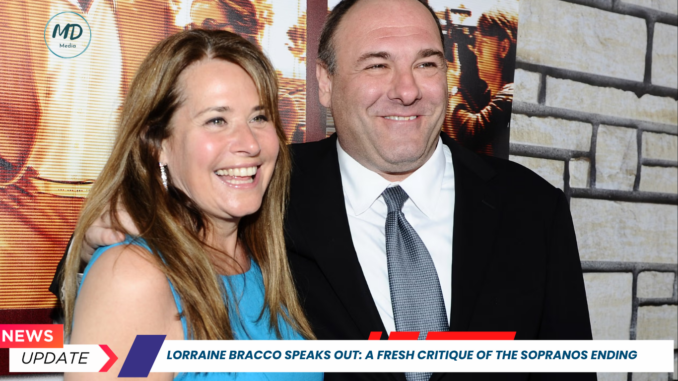
It’s been 17 years since The Sopranos aired its iconic finale, and fans have had no shortage of opinions on its infamous ending. For a long time, discussions have centered around the abrupt cut-to-black and the haunting implications of Tony Soprano’s fate. But recently, Lorraine Bracco, who portrayed Dr. Jennifer Melfi, has given us a refreshing take that steers clear of the usual rhetoric. Instead of dissecting the moment Tony might have met his end, Bracco zeroes in on something equally critical—the conclusion of Melfi’s journey with Tony.
Bracco’s Heartfelt Disappointment
In a candid interview with SiriusXM’s Jennifer Shaw, Bracco revealed her lingering disappointment over the way her character’s arc concluded. She didn’t mince words when she expressed her feelings about Melfi’s decision to sever ties with Tony. “I couldn’t believe that. I was heartbroken,” she confessed. For Bracco, it wasn’t just a plot point; it was a deeply emotional moment that felt unjust.
A Unique Perspective on Therapy
What makes Bracco’s critique so compelling is that it shifts the conversation from Tony’s fate to the therapeutic journey between Melfi and her patient. In the penultimate episode, “The Blue Comet,” Melfi comes to the realization that her sessions have not redeemed Tony; instead, they have only made him more cunning. This decision to end their relationship is significant, representing one of the few moments in the series where a character fully grasps the reality of Tony’s nature.
Melfi’s choice is a stark contrast to many other relationships in the show, where loyalty and moral ambiguity reign. She embodies a kind of moral clarity that, while painful, serves as a powerful critique of the corrosive influence Tony has on those around him.
The Impact on Fans and Characters
Fans have long debated the ending’s implications, but Bracco’s perspective sheds light on the emotional stakes involved. When she told David Chase, “How do you invest five years into someone’s life and just walk away?” she encapsulated the feelings of many viewers who felt similarly invested in the characters.
In a world filled with morally complex figures, Melfi stands out as a character who seeks to do the right thing. Her decision to cut ties with Tony is not just about him; it’s also about her own well-being. It highlights a crucial theme in the series: the idea that some relationships can be toxic and that recognizing this is a form of strength.
Hope for a Reunion: A Therapist’s Wish
Bracco’s hopes for Melfi and Tony to cross paths again adds another layer to this narrative. In her mind, there’s a possibility that they might bump into each other someday and resume therapy, reversing that climactic decision. This notion speaks volumes about the complexity of their relationship and the hope for redemption—even if it’s somewhat naive.
It’s an intriguing idea: what if Melfi and Tony could have found a way to reconnect? Would she have been able to break through the barriers he constructed? Bracco’s longing for this reconciliation highlights the unresolved tension that exists not just between characters but also within the audience.
The Moral Center of The Sopranos
Melfi’s decision to end therapy with Tony also solidifies her role as the show’s moral center. Throughout The Sopranos, characters often grapple with their own morality, but Melfi represents a clear-eyed view of what is right and wrong. By choosing to cut him off, she embodies a rare moment of clarity in a series rife with ethical ambiguity.
In many ways, her final stand against Tony is one of the most powerful moments in the show. It forces viewers to confront the harsh reality of Tony’s character—a man who, despite his charm, is fundamentally broken and unable to change.
Moving Beyond the Cut-to-Black
Finally, it’s refreshing to engage in a conversation about The Sopranos finale that doesn’t revolve around whether Tony got whacked while munching on onion rings. Bracco’s critique adds depth to the discussion, focusing on the emotional and moral ramifications of the characters’ decisions.
While fans continue to argue about the meaning behind the cut-to-black moment, Bracco’s perspective invites a richer conversation. It asks us to consider the implications of Melfi’s choice, and what it means for her character, Tony, and the series as a whole.
Conclusion: Revisiting the Legacy of The Sopranos
Lorraine Bracco’s recent remarks remind us that The Sopranos is more than just a story about mobsters; it’s a complex exploration of relationships, morality, and personal growth. Her critique not only highlights the emotional depth of Melfi’s journey but also sheds light on the broader themes that resonate throughout the series.
As we revisit the legacy of The Sopranos, Bracco’s fresh perspective encourages us to dig deeper into the characters we thought we knew. It’s a testament to the enduring impact of the show and a reminder that, even after all these years, there’s still plenty to discuss.
